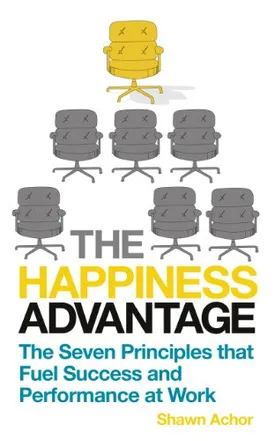The Happiness Advantage: The Seven Principles of Positive Psychology That Fuel Success and Performance at Work by Shawn Achor
The Happiness Advantage by Shawn Achor is an inspiring guide that uses positive psychology to give readers the tools to achieve success in their personal and professional lives. This book takes a unique approach to the traditional motivation and leadership models by focusing on positive thinking, the power of emotions, and the importance of mindset. Achor reveals how small changes in attitude can make all the difference in achieving success.
In the book, readers are presented with seven principles of positive psychology which Achor believes will help them unlock their potential and reach greater heights of success in their chosen career and life. These seven principles revolve around how an individual “sees” and works within their world, and how these principal connections can positively affect our lives.
The first principle is “The Happiness Advantage.” This principle states that when one is happy and positive, they are more likely to work harder, smarter, and more effectively. Thus, by adopting a mindset of positivity and happiness, an individual can gain a significant competitive advantage in their chosen field. Achor goes on to discuss how increasing time spent on positive endeavors can actually cause a profound shift in one’s behavior, neurochemistry, and performance. He also emphasizes the importance of developing meaningful connections with those around us, which can help to improve our job performance.
The second principle is “The Fulcrum and the Lever.” This principle states that individuals have the ability to use small shifts in behavior to have massive impacts in their lives. Achor explains that when we combine small shifts in our perspective, daily habits, and choices, we can achieve meaningful results in our lives.
The third principle is “The Tetris Effect.” This principle states that when we focus on the positive, it becomes easier to recognize and make use of the opportunities which present themselves in our everyday lives. Achor explains that when we consistently focus on recognizing and creating positive thoughts and actions, our brain becomes better at picking up on the signs of opportunity – much in the same way the hit game Tetris works.
Fourthly, “The mysterious phenomenon of FAIL” states that failure should not be feared, but rather embraced, to help individuals learn valuable lessons, develop a stronger work ethic, and become better innovators. Achor suggests that embracing mistakes and using failure as an opportunity for learning is more beneficial than avoiding risks and making conservative decisions.
The fifth principle is “The Zorro Circle,” which states that individuals should focus on small, achievable goals in order to have a higher rate of success. Achor explains that small, achievable goals serve as stepping stones to greater things and by tackling simple tasks one-by-one, we can take control of our lives and find success over time.
The sixth principle is “Social Investment.” This principle reminds us that our lives are interconnected, and that investing in relationships and helping those around us can have a positive effect on our own lives and performance. By helping others succeed, we can also succeed in life through the sense of belonging and well-being that comes from these mutual investments.
The seventh and final principle is “The 20-Second Rule.” This principle discusses how the ease of making a change is key to success. Achor explains that by buffering the difficulty of change by 20 seconds – such as limiting temptations and creating an easier environment – we can “trick” ourselves into adopting more positive habits, leading to better performance and success.
The Happiness Advantage discusses a range of principles that provide readers with the necessary tools to enhance success and performance in the workplace and their personal lives. Achor’s book encourages readers to use small shifts in their mindset to achieve greater rewards, while engaging the power of emotions and forming deep and meaningful relationships. By following the seven principles outlined in The Happiness Advantage, readers will learn how to find true success and happiness in their work and life.

